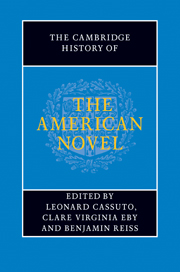Book contents
- Frontmatter
- General Introduction
- PART ONE INVENTING THE AMERICAN NOVEL
- PART TWO REALISM, PROTEST, ACCOMMODATION
- PART THREE MODERNISM AND BEYOND
- Introduction: modernism and beyond
- 37 Stein, Hemingway, and American modernisms
- 38 The Great Gatsby and the 1920s
- 39 Philosophy and the American novel
- 40 Steinbeck and the proletarian novel
- 41 The novel, mass culture, mass media
- 42 Wright, Hurston, and the direction of the African American novel
- 43 Ellison and Baldwin: aesthetics, activism, and the social order
- 44 Religion and the twentieth-century American novel
- 45 Faulkner and the Southern novel
- 46 Law and the American novel
- 47 Twentieth-century publishing and the rise of the paperback
- 48 The novel of crime, mystery, and suspense
- 49 US novels and US wars
- 50 Science fiction
- 51 Female genre fiction in the twentieth century
- 52 Children's novels
- 53 The American novel and the rise of the suburbs
- 54 The Jewish great American novel
- 55 The Beats and the 1960s
- 56 Literary feminisms
- 57 Reimagining genders and sexualities
- PART FOUR CONTEMPORARY FORMATIONS
- A selected bibliography
- Index
Introduction: modernism and beyond
from PART THREE - MODERNISM AND BEYOND
Published online by Cambridge University Press: 28 July 2011
- Frontmatter
- General Introduction
- PART ONE INVENTING THE AMERICAN NOVEL
- PART TWO REALISM, PROTEST, ACCOMMODATION
- PART THREE MODERNISM AND BEYOND
- Introduction: modernism and beyond
- 37 Stein, Hemingway, and American modernisms
- 38 The Great Gatsby and the 1920s
- 39 Philosophy and the American novel
- 40 Steinbeck and the proletarian novel
- 41 The novel, mass culture, mass media
- 42 Wright, Hurston, and the direction of the African American novel
- 43 Ellison and Baldwin: aesthetics, activism, and the social order
- 44 Religion and the twentieth-century American novel
- 45 Faulkner and the Southern novel
- 46 Law and the American novel
- 47 Twentieth-century publishing and the rise of the paperback
- 48 The novel of crime, mystery, and suspense
- 49 US novels and US wars
- 50 Science fiction
- 51 Female genre fiction in the twentieth century
- 52 Children's novels
- 53 The American novel and the rise of the suburbs
- 54 The Jewish great American novel
- 55 The Beats and the 1960s
- 56 Literary feminisms
- 57 Reimagining genders and sexualities
- PART FOUR CONTEMPORARY FORMATIONS
- A selected bibliography
- Index
Summary
Literary history is a messy business. Novels refuse to stay contained within categories, and periodization – that other stock in trade of literary history – is often necessary, yet invariably contingent. Examining very different terrains, John Carlos Rowe and Elizabeth Freeman reflect on the consequences of imposing ideas of order on the disarray of literary texts. Rowe shows how the category “war novel” obscures internal conflicts in the US that culminate in military action and how “recognized ‘wars’” shape literary history by determining its “periodizing” markers – and so we have antebellum literature, literature between “the wars,” and so on. Freeman demonstrates how “male dominated, nationalist military history or presidential policy” can dictate the periods of literary history, obscuring as much as they reveal. She argues that “gender/sexual dissidents” challenge “even the principal terms that organize this volume: ‘History,’ ‘American,’ and ‘Novel.’ “
This section of The Cambridge History of the American Novel especially chafes against literary-historical period markers and labels: it centers on the period from the 1920s through the 1970s but spills out chronologically in both directions and mingles discussion of internationally acclaimed innovators with accounts of formula-driven popular practitioners. Thus the “beyond” in the title describes this section's contents as much as does the leading term, “modernism.”
The chapters here illustrate that the practitioners of popular forms – as much as the towering innovators whom Ezra Pound had in mind when he urged writers to “make it new” – respond creatively to modernity.
- Type
- Chapter
- Information
- The Cambridge History of the American Novel , pp. 615 - 621Publisher: Cambridge University PressPrint publication year: 2011



